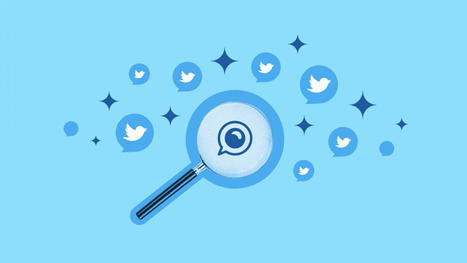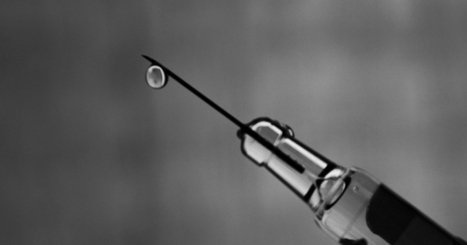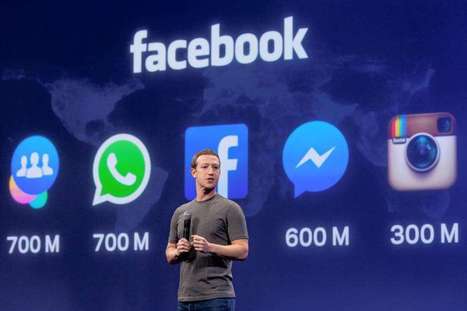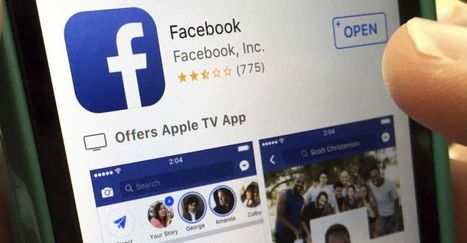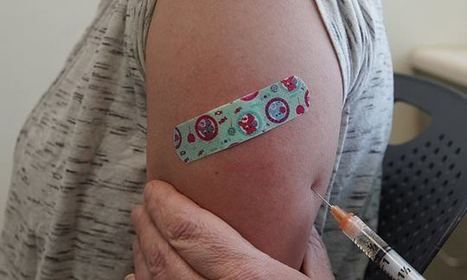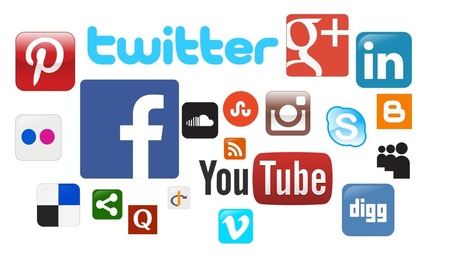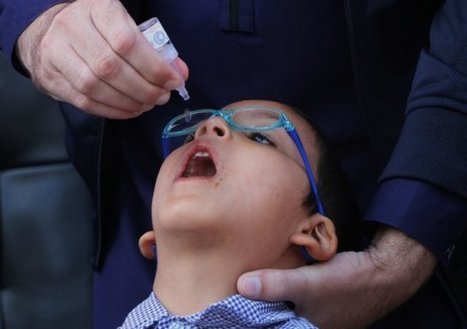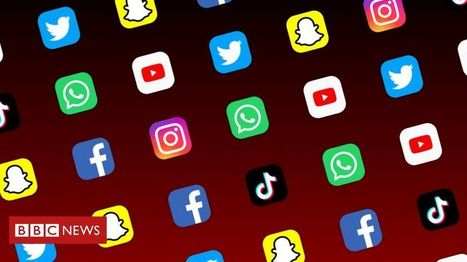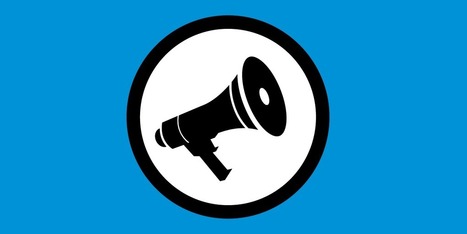Get Started for FREE
Sign up with Facebook Sign up with X
I don't have a Facebook or a X account

 Your new post is loading... Your new post is loading...
 Your new post is loading... Your new post is loading...
Twitter lance une expérimentation sur une nouvelle fonctionnalité, appelée Birdwatch, qui consiste à donner des responsabilités à ses membres. En clair, ils pourront participer à la lutte contre la désinformation, en signalant des tweets litigieux et en ayant la possibilité de fournir du contexte.
It is common that patient searches for information and products related to the word “vaccine” yield top results pointing to harmfully inaccurate information about immunization safety. This place of prominence given to medical disinformation is deeply troubling to America’s physicians, especially amid alarming new reports regarding measles, tetanus and other vaccine-preventable conditions. The AMA sent a letter to top executives at Amazon, Facebook, Google, Pinterest, Twitter and YouTube urging them to do even more to stem the “proliferation” of “health-related misinformation” that has helped vaccine-preventable diseases to reemerge. “We applaud companies that have already taken action but encourage you to continue evaluating the impact of these policies and take further steps to address the issue as needed,” AMA Executive Vice President and CEO James L. Madara, MD, wrote in the letter to the social media and digital technology executives. “The overwhelming scientific evidence shows that vaccines are among the most effective and safest interventions to both prevent individual illness and protect public health.” Dr. Madara noted that, when immunization rates are high, children who are too young to be vaccinated and others whose health conditions prevent them from being vaccinated, are protected from disease because exposure is so limited. These conditions include allergies to vaccine components, HIV infection and having a compromised immune system as a result of receiving chemotherapy cancer treatment. Related CoveragePhysicians agree: Vaccination crucial to public healthThe impact of lower vaccination rates has been clear. The World Health Organization named vaccine hesitancy among the top 10 threats to global health in 2019. The Centers for Disease Control and Prevention (CDC) reported that there have been at least 228 individual measles cases confirmed in 12 states between Jan. 1 and March 7, 2019, with 71 of those traced to Clark County in Washington. Four confirmed cases in Oregon were linked to the Clark County outbreak. In another report out of Oregon, the CDC told of an unvaccinated 6-year-old boy who contracted tetanus and required 57 days in the hospital and almost $1 million in care before being released. Upon release, his parents still declined giving him recommended vaccinations, according to the CDC. “The reductions we have seen in vaccination coverage threaten to erase many years of progress as nearly-eliminated and preventable diseases return, resulting in illness, disability and death,” Dr. Madara wrote. “In order to protect our communities’ health, it is important that people be aware not just that these diseases still exist and can still debilitate and kill, but that vaccines are a safe, proven way to protect against them.” Spreading vaccine safety messageTo help spread this message and to counter misinformation campaigns, the National Academies of Sciences, Engineering and Medicine created a website displaying the overwhelming evidence that vaccines are safe. This message was repeated again in the Annals of Internal Medicine, which published a Danish study, “Measles, Mumps, Rubella Vaccination and Autism: A Nationwide Cohort Study,” that followed almost 660,000 children and found no connection between the measles, mumps, rubella (MMR) vaccine and autism. “The study strongly supports that MMR vaccination does not increase the risk for autism, does not trigger autism in susceptible children, and is not associated with clustering of autism cases after vaccination,” the researchers wrote. “It adds to previous studies through significant additional statistical power and by addressing hypotheses of susceptible subgroups and clustering of cases.” Ending nonmedical vaccine exemptionsIn addition to engaging digital and social media executives, the AMA has been active in state legislaturessupporting bills seeking to eliminate non-medical exemptions for required childhood vaccines in Maine, Oregon and Washington. The AMA is also opposing an Arizona bill that would discourage adherence to recommended vaccine schedules. California, Mississippi and West Virginia are the only states that do not allow parents to opt out of vaccinating their children for personal, philosophical or religious reasons. Via nrip
Instagram will BLOCK anti-vaxxer hashtags in crackdown on medical fake news on the social-media siteVaccination fears soared following a study by the disgraced gastroenterologist Andrew Wakefield that the measles, mumps and rubella (MMR) jab can lead to autism in 1995. His controversial views have since been widely discredited and Wakefield has been struck off - but vaccination rates plummeted in the wake of the study. An Instagram spokesperson said in a statement: 'As part of our work to address health-related misinformation on Instagram, we’re looking at ways to minimize recommendations of this content and accounts that post it across Instagram. '[This includes] in "Suggested For You", Explore and hashtags. 'We noted that this process would take place over several weeks. 'But as we take action in the short-term we know that fighting misinformation is a long-term commitment.' Although searching for anti-vaxx content still brings up a host of results, Instagram bosses insist clicking on a blocked hashtag will soon take users to a blank page without results. This comes after Facebook announced at the beginning of the month it will be limiting anti-vaxx misinformation from its groups, pages and news feeds. Adam Schiff - US representative for California's 28th congressional district - pressed Facebook CEO Mark Zuckerberg and Google's chief executive officer Sundar Pichai over the spread of anti-jab fake news on these platforms. Mr Schiff claimed algorithms demonstrate Facebook and Google - which owns YouTube - are promoting anti-vaxx messages. In another attempt to crack down on the anti-vaxx brigade, Facebook has banned adverts that include 'misinformation about vaccines', according to a blog post put out by the social-media giant. A controversial advert was banned on Facebook last November for claiming all jabs have the potential to kill a child. The Advertising Standards Authority (ASA) said the paid-for post by Stop Mandatory Vaccination was 'distressing' and 'misleading'. And YouTube announced it will no longer recommend anti-jab videos to its users. The Facebook-owned company has come under pressure from lawyers and public-health experts for not doing enough to stop the anti-vaxx brigade. Pictured is a controversial post that questions the safety of jabs that comes up when users search for vaccines Pictured is another anti-vaxx post that Instagram users can easily find via the search bar The US is in the midst of a measles outbreak, which has struck 15 states and is believed to be driven by growing anti-vaccine sentiments. Social media has helped the movement gain momentum, with anti-vaxxers often leaving a slew of comments objecting the scientifically-proven preventative measure. In order for vaccines to protect a population from diseases, between 90 and 95 per cent of that group needs to have gotten their shots. But in 2017, just 70 per cent of toddlers in the US aged between 19 and 35 months old had received all of the vaccinations recommended to them by the Centers for Disease Control and Prevention. And while the UK remains a world leader in vaccine coverage, rates have declined in nine of 12 vaccinations given routinely to children in England, figures show. Via nrip
Article 3472. L'armement des médias sociaux: le danger biologique des campagnes de désinformation russes - Par Sarah Jacobs Gamberini *eurasiareview.com/07122020-social-media-weaponization-the-biohazard-of-russian-disinformation-campaigns-analysis/ Dans une ère renouvelée de concurrence des...
Hong Kong (CNN Business)Facebook (FB) says it will start taking down bogus claims about purported "cures" and other unproven theories surrounding the coronavirus, as the deadly outbreak continues to spread globally, sparking a surge in online chatter and misinformation. The company will "remove content with false claims or conspiracy theories that have been flagged by leading global health organizations and local health authorities that could cause harm to people who believe them," according to a blog post published Thursday by Kang-Xing Jin, Facebook's head of health. Jin said that includes claims "related to false cures or prevention methods" or "that create confusion about health resources that are available." The company also plans to increase its fact-checking and monitoring efforts on Instagram, which it also owns. Jin said users who click on a hashtag related to the coronavirus will now be served with a "pop-up with credible information." The social network wants to prioritize legitimate sources of information, Jin said, by letting select organizations run free ads that help educate people about the virus and also boosting posts that fall in line with health experts' guidance to the top of users' Facebook feeds. It did not specify which organizations would be included. Jin noted in the Thursday blog post that not all the new measures were "fully in place" yet. "It will take some time to roll them out across our platforms and step up our enforcement methods," he wrote. "We're focusing on claims that are designed to discourage treatment or taking appropriate precautions." The move is Silicon Valley's latest attempt to combat misinformation about the outbreak, which has infected more than 9,800 people around the world and killed more than 200 in mainland China. The World Health Organization (WHO) on Thursday declared the outbreak "a public health emergency of international concern." Twitter and Google have also stepped up efforts this week to guide their users to verified sources on the subject. Google (GOOGL) announced Thursday that when people search for information about the coronavirus, it will pull up a special notice with updates from the WHO. YouTube, which is owned by Google, said it will promote videos from credible sources when people search for clips about the virus. The company said it specifically points to content from trusted users, such as public health experts or news outlets, in search results or panels that suggest which videos to watch next. Twitter (TWTR) said Wednesday that it would begin prompting users who search for the coronavirus to first visit official channels of information about the illness. In the United States, for example, Twitter directs users to the Centers for Disease Control and Prevention, beneath a bold headline that reads: "Know the facts." The campaign is running in 15 locations, including the United States, the United Kingdom, Hong Kong, Singapore, and Australia, and "will continue to expand as the need arises," the company said in a blog post. Looking for the latest information about the novel #coronavirus? We've recently adjusted our search prompt to ensure authoritative health sources appear upfront when you search on Twitter� #knowthefacts pic.twitter.com/LlYUAdLSBy — Twitter Singapore (@TwitterSG) January 29, 2020 As of Wednesday, Twitter said that it had already seen more than 15 million tweets about the coronavirus in four weeks, "and that trend looks set to continue." A company spokesperson told CNN Business earlier this week that it had not seen a coordinated increase in disinformation related to the virus, but would "remain vigilant" on the issue. The moves this week are notable, particularly since social networks have long been criticized for allowing the spread of misinformation. Facebook, which now claims about 2.5 billion monthly users on its flagship network and a combined 2.9 billion monthly active users across its other apps like WhatsApp and Instagram, has had major problems restricting hoaxes about vaccines, for example. Instagram last year vowed to block more hashtags that surfaced vaccine misinformation after a CNN Business report found that content promoted by anti-vaccination accounts were still thriving on the platform. While the company frequently touts its army of fact-checkers and reviewers who are paid to debunk false claims, the effectiveness of its policies remain in question. On Thursday, some people pointed out that a search for "vaccines" on Instagram still brought up several pages linked to dangerous misinformation. Yikes. Just checked Instagram and got same results. https://t.co/Qwr812xknV — Amanda Katz (@katzish) January 30, 2020 Facebook did not immediately respond to a request for comment when asked about those searches. -- Donie O'Sullivan contributed to this report.
The World Health Organization said the spread of inaccurate vaccine information is "a major threat to global health that could reverse decades of progress made in tackling preventable diseases."
Dix semaines après que Facebook s’est engagé à lutter contre la désinformation sur les vaccins, ce type de contenu reste largement disponible sur ses plateformes alors que le géant des réseaux sociaux s’efforce de limiter la propagation de contrevérités et d’impostures.
Users will now be directed to a 'credible public health resource' when they conduct a search using specific keywords associated with vaccines, Twitter said on Tuesday. |
But researchers monitoring online platforms for the federal government say they are hopeful that in the future social media can help normalise the vaccinations as more Australians receive the jab.
If you have been paying attention to the news of late, you may have noticed headlines like… How Pinterest Jumped Into the Fight Against Health Misinformation Amid measles outbreaks, Facebook considering how to reduce spread of anti-vaccine content YouTube pulls ads from anti-vaccination videos after questions about enforcement Before you yell “censorship”, please bear with me and let’s take a look at how these social media giants came to feel it necessary to intervene on the seemingly uncontrolled dissemination of health-related “fake news” across their sites. In the NPR interview highlighted above, Audie Cornish talks to Ifeoma Ozoma, Pinterest’s public policy and social impact manager, about the organization’s move to limit search results for health misinformation. As someone who is very passionate and enthusiastic about educating my patients and the public about the safety and efficacy of vaccines, it was a bit unsettling to read Ozoma’s take on the vaccine information situation that is happening online and on social media channels. Here is what Ozoma had to say… “There’s an enthusiasm gap between those who save harmful health information and organizations like the CDC and WHO and American Academy of Pediatrics. And so because of that, you’re going to find more health misinformation than, say, journal articles on the virtues of vaccination or other science-based health interventions.” An “enthusiasm gap”…. Ouch! Though it may sting a little to hear it, I know that Ozoma’s assessment of the situation is accurate. Our (the medical community) professional organizations have been lax in their defense of vaccines. We have rested on our laurels, trusting that patients will follow our medical advice just because we give it. We have assumed that the evidence will speak for itself. However, there has been an eroding of public confidence in science, in the advice of institutions, and in the medical community which is unfortunately affecting patients’ inclination to trust their physician’s recommendations without question (this warrants a whole other article… looking at the origins of mistrust and what we can do to regain our patients’ confidence). But, like it or not, this is the situation we are in. And, while anti-vaccine groups have marketing strategies and political action committees and money and time to spend flooding the airwaves with bad information, we physicians and other medical providers have been quietly sharing our pro-vaccine message only one or two people at a time, as we see them in our exam rooms. This is no way to counter a social media machine and our efforts have to adapt. I wrote a prior blogpost called Making Dr. Google Work for You, discussing ways that those reading health information online can try to sort out the bad information from the good so that their healthcare choices are based on science and fact, not pseudoscience and fear. I’d like to take a moment to highlight why this is so important and how common it can be for people to fall prey to misinformation. Let’s look at a couple of examples… Example #1: “Dr.” Dena Churchill Here is a tweet from “Dr.” Churchill instructing patients to educate their MDs regarding the “truth” about vaccines. The “Dr.” in front of her name would suggest that she is a medical doctor with the training to be able to comment authoritatively on the topic of vaccines. However, unless we dig a little deeper, which few unsuspecting lay people reading this tweet are likely to do, we would not know that Dena Churchill is a chiropractor, not a medical doctor. Unless we push past the surface, we would not know that she is currently being reviewed by her licensing board and at threat of losing her license to practice chiropractic because of her vocal misinformation campaigns regarding health-related concerns outside her scope of practice. Follow this link to see a CBC article about Churchill’s claims. She makes numerous inaccurate and dangerous statements about vaccine safety and efficacy; she suggests that wearing a bra increases the risk of cancer to an even greater degree than smoking; and she supports such loony therapies as “vaginal steaming”, like a facial for your vagina! This is not someone we can trust to give us advice about much of anything medically related. Thank you to Dr. Jaime Friedman (an actual doctor of pediatrics) and the many others online who called her out for misrepresenting her credentials and to the Nova Scotia College of Chiropractors for recognizing how dangerous statements such as Churchill’s can be. Example #2: The American College of Pediatricians Sounds official right? And it is an official organization, but this is not the well-respected governing body of U.S. pediatricians. That would be the American Academy of Pediatrics (the AAP). This group came to my attention via one of my medical assistants who brought me an article printed off of the internet with the following headline… If we don’t dig deeper, this headline would certainly be worrisome. But if we look into these claims further, several disturbing facts arise that should make us question what we are reading.
“Adverse events that occur after vaccines are frequently not caused by the vaccine and there has not been a noticeable rise in POF cases in the last 9 years since HPV4 vaccine has been widely used.” And this, my friends, is just the tip of the iceberg. There are so many faulty health-related and vaccine-related statements out there that look for all the world like legitimate news. How and when is the average person supposed to sort through it in order to make sense of it all? We have too easily trusted our social media news sources and taken things at face value but we can’t afford to do this any longer. The stakes are too great. Just as we would expect our television news agencies to be responsible to the weight of evidence and to report the truth, not spreading fear and misinformation that might adversely affect the health or safety of the population, so must we demand that our social media news sources do the same. What is happening with our social media outlets is not “censorship”. It is responsible reporting. Freedom of speech does not allow us to say things that are irresponsible and dangerous. We cannot yell “fire” in a crowded movie theatre, for example. It would put people’s lives at risk. Likewise, anti-vaccine articles that yell “conspiracy” or “danger” or “toxins”, when none of this has proven true, are putting the lives and the health of the people, particularly our children, at risk. This cannot stand. All of that being said, I don’t want you to come away from this thinking that everything you read on the Internet is false or that physicians and other trusted medical providers are not making good faith efforts to provide reliable health content. There are some truly good sources of information out there and the Internet and social media can be an excellent resource for health advice. You just have to know where to look. If you are seeking a reliable Twitter group to follow, consider @somedocs (Doctors on Social Media, #SoMeDocs). This is a group of real live doctors who are taking their healthcare messages to the streets of social media to offer reliable, factual information on a variety of health-related topics. For those with a more “natural” bent, check out the Facebook group NDsForVaccines. Search the Children’s Hospital of Philadelphia (CHOP) Vaccine Education Center site and the AAP’s HealthyChildren.org for highly reliable information on all vaccine-related topics. And, at the end of the day, if you are still confused, make an appointment with your doctor or other medical provider. While offering medical advice across the airwaves is, perhaps, the wave of the future, what holds the most meaning for us as physicians and patients is the doctor-patient relationship. The ability to talk through your concerns with your trusted provider, who has your best interests at heart and who is devoted to your health and wellbeing, can be invaluable. Via nrip
The internet has long been a place for the free exchange of ideas, regardless of the ideological beliefs of the posters. Indeed, the idea of internet censorship is anathema to Americans, whose free speech is protected by the First Amendment. But what can be done about the growing amount of harmful misinformation intended to influence thousands of people to make decisions that put not only their lives, but the lives of their and others’ children, at risk? Such is the situation for the anti-vaccination, or “anti-vax,” community, thousands of whose members flock to social media pages where they promptly remove “pro-vax trolls,” and post fear-mongering memes and exaggerated personal anecdotes. They also direct like-minded individuals to websites like vaccineimpact.com, which promotes error-filled articles topped by misleading headlines such as “WARNING: Dangerous flu shots being given to children without parental consent” and “FDA decision to approve Gardasil vaccine for adults will likely increase cervical cancer rates.” If it were only a matter of putting oneself at risk by refusing vaccination, we would not necessarily be called to action. After all, a personal choice is just that, regardless of how silly it may seem to outsiders. But people who refuse vaccines for themselves and their families are putting the most vulnerable members of their community at risk of severe illness or death. Case in point: In 2018, measles rates in the United States continued to skyrocket, with over 1,700 cases reported since 2010 even though just two decades ago, it was largely eliminated from the country. The situation is even worse in Europe. In the first six months of 2018, more than 41,000 Europeans were infected with measles and 37 died. The recent uptick in preventable infectious disease-related morbidity and mortality has been directly linked to the increasing rate of parents who opt out of vaccinating their children. Many of those in the anti-vax community are energized by Andrew Wakefield’s 1998 Lancet article, which linked the MMR vaccine to autism. Though the article was retracted in 2010 and Wakefield lost his medical practice license, it circulated very widely and became an integral component of anti-vax communities around the world. Unfortunately, misinformation tends to spread faster and more profusely than the truth. According to a study from 2018, the top 1 percent of false news cascades propagated on Twitter from 2006 to 2017 diffused to between 1,000 and 100,000 people, while the truth rarely diffused to more than 1,000 people. Such was the case in October 2014, when another article linking autism and the MMR vaccine went viral, despite its retraction just a month after its original publication due to unstated conflicts of interest and questionable methods and statistical analysis. Not only did it circulate through anti-vaccination websites for weeks, but it also became mainstream once it was published on a CNN-affiliated website, which subsequently garnered more than 786,000 views and 256,000 shares on social media. Measles is not the only preventable disease on the rise because of vaccine rejection, nor are Western nations the only countries with vaccine skeptics. Northern Nigeria poses a threat to the worldwide eradication of polio because of rumors, misconceptions and anti-polio vaccine propaganda circulating the region. Much of the distrust in the polio vaccine stems from claims made by local Muslim clerics that the vaccines were contaminated with anti-fertility agents, HIV and cancerous agents. Further complicating the issue is a general distrust of aggressive, mass immunization programs in a country where basic healthcare is not easily available. Given the vast scale of misinformation, it is important that there be a very active counter-movement to dispel myths, especially those that counter the well-being of citizens and scientifically sound public health principles. There are many strategies that could be developed and expanded in a robust effort to refute misinformation using commonly available communications tools. For instance, billboards, posters, signs and online media could more effectively promote how vaccinations are safe, easy and appropriate. Active use of Twitter, Facebook and Instagram can rapidly correct misinformation, rumors or false information. Likewise, creative campaign partnerships with known, respected organizations, like FEMA, Red Cross or the American Academy of Pediatrics can be effective. Faith leaders, survivors and medical professionals also add credibility to messaging. In places where the internet is not as widely available, mass public awareness campaigns can be created about why vaccines are so important using radio, television, print media, local music and theater. And we would not be above calling out “conspiracy sites” and statements based on ignorance. Finally, we should start early, making sure that young people, at least by middle school and continuing through higher education, understand science and how to distinguish between credible and non-credible information. While there is no single infallible strategy capable of overcoming all the intricacies of correcting people’s misinformed beliefs, the most successful corrective strategies aim to tailor different, simultaneous and frequent interventions in order to increase the likelihood of people making sound decisions about their own health and the health of their communities. Rachel Alter is a graduate research assistant at the National Center for Disaster Preparedness at Columbia University. Follow her on Twitter @rachelalter007. Irwin Redlener, M.D., is president emeritus and co-founder of the Children's Health Fund and has more than three decades of experience providing healthcare to medically underserved children. Redlener is also the director of the National Center for Disaster Preparedness at Columbia University’s Earth Institute, and professor of Health Policy and Management at the Mailman School of Public Health at Columbia University. Follow him on Twitter @IrwinRedlenerMD. Via Plus91
Negative messages about vaccines propagated on the social media are acting as the main barrier to vaccinations, a report from the UK-based charity Royal Society for Public Health (RSPH) has revealed. The report, titled Moving the Needle, identified two in five (41 per cent) parents, saying they are often or sometimes exposed to negative messages about vaccines on social media. This increased to as many as one in two (50 per cent) among parents with children under five years old. Traditional media, on the other hand, continued to be influential, and was highlighted by healthcare professionals as impacting the public's views on vaccines. The fear of side effects of vaccines was found to be the primary reason for choosing not to vaccinate, while lack of confidence in the effectiveness of the vaccine was the key reason for parents choosing not to vaccinate their children against flu, the report said. "Fear and misinformation about vaccines can cause significant damage to seemingly stable vaccination programmes," said RSPH Chief Executive Shirley Cramer. "With the dawn of social media, information - and misinformation - about vaccines can spread further and faster than ever before and this may, unfortunately, be advantageous for anti-vaccination groups," Cramer added. The report also called for social media platforms and the press to do more to combat "fake news" as millions of lives have been saved through vaccination, and side effects are rare. It suggested that efforts to limit health misinformation online and via social media should be increased, especially by social media platforms themselves. Education on vaccines in schools should be increased and improved. Access to vaccinations must be improved and it should be offered in a more diverse range of locations, including high street pop-ups, utilising the wider public health workforce. The report is based on the findings of surveys of nearly 5,000 people across the UK on their awareness and attitudes towards vaccines, such as MMR, the flu jab and HPV. They include 2,600 parents, 2,000 other adults and more than 200 healthcare professionals, such as nurses, pharmacists and general practitioners. Via Plus91
A report puts forward a tranche of ideas that could help reduce the spread of misinformation.
Facebook, which owns Instagram, is rolling out new educational pop-up windows on both platforms to combat the spread of misinformation about vaccines, particularly anti-vaccination content.
Doctor recruiting doctors to fight fake health info on social media #esante #hcsmeufr #digitalhealthAustin Chiang's mission is to recruit doctors to social media, so they can drown out health misinformation and bad medical advice. Via Lionel Reichardt / le Pharmageek
Twitter joins Pinterest, Facebook, and YouTube in trying to filter out vaccine misinformation online. But will it be enough?...
From
www
With measles cases on the rise for the first time in decades and anti-vaccine (or “anti-vax”) memes spreading like wildfire on social media, a number of companies—including Facebook, Pinterest, YouTube, Instagram, and GoFundMe—recently banned anti-vax posts.But censorship cannot be the only... |




